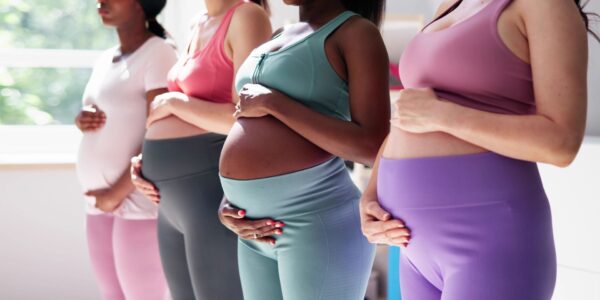
Many vaccines are safe and are recommended during pregnancy. When a pregnant woman gets vaccinated, her body creates antibodies that are passed on to the baby before birth. These antibodies help provide protection until the baby is old enough to get vaccinated.
Getting vaccinated is the best and safest way for pregnant women to help protect their babies and themselves from influenza (flu), COVID-19, respiratory syncytial virus (RSV), whooping cough (pertussis), and other vaccine-preventable diseases.
Vaccines Recommended during Pregnancy
The Centers for Disease Control and Prevention (CDC) recommends the following vaccines during pregnancy:
COVID-19
Everyone age 6 months and older, including pregnant women, should stay up to date on
COVID-19 vaccines.
Pregnant women with COVID-19 may be more likely to experience preterm birth and severe illness. Getting a COVID-19 vaccine during pregnancy can protect pregnant women and babies from severe illness related to COVID-19.
COVID-19 vaccination is recommended for women who are pregnant, breastfeeding, trying to get pregnant, or who may become pregnant in the future.
Flu (Influenza)
Everyone age 6 months and older, including pregnant and breastfeeding women, should get vaccinated against
flu every year.
Pregnant women and babies are at increased risk for complications from flu, including pneumonia, hospitalization, and even death. Babies cannot be vaccinated against flu until they are age 6 months or older. The best way to protect them is by making sure that those in close contact with them are vaccinated, including parents, grandparents, and caregivers.
Pregnant women can be vaccinated during any trimester with an inactivated, injectable influenza vaccine (they should not receive the nasal spray vaccine).
Respiratory Syncytial Virus (RSV)
There are 2 ways to protect babies from
RSV: Pregnant women can get vaccinated against RSV, or babies can receive a preventive monoclonal antibody after delivery.
Even though it is often associated with mild, cold-like symptoms, RSV can be serious for infants and toddlers. In the US, RSV is the most common cause of bronchiolitis (inflammation of the small airways in the lung) and pneumonia in children younger than 1 year of age.
CDC recommends that pregnant women receive 1 dose of RSV vaccine during weeks 32-36 of pregnancy during September through January in the US. Or, CDC recommends 1 dose of nirsevimab (a long-acting monoclonal antibody) for all babies younger than age 8 months who are born during or entering their first RSV season (typically October through March). For children between ages 8-19 months who are at increased risk of severe RSV disease, including those who are severely immunocompromised, CDC recommends 1 dose in their second RSV season.
Whooping Cough (Pertussis)
Pregnant women should get vaccinated against
whooping cough during each pregnancy.
Whooping cough can be serious for anyone, but it can be life-threatening for a newborn baby. Most pediatric deaths from whooping cough are among babies younger than age 2 months, who are too young to get vaccinated against whooping cough.
Pregnant women should get a single dose of tetanus-diphtheria-pertussis (Tdap) vaccine, preferably early in the third trimester of each pregnancy, to help protect mother and baby.
Immediate family members are the most common source of infant infection with whooping cough, which is why it is important that partners, grandparents, and others who are around infants are up to date with Tdap vaccination.
Vaccines Not Recommended during Pregnancy
Live vaccines are generally not recommended during pregnancy. Live vaccines contain a weakened version of the live virus.
Pregnant women should not receive the nasal spray flu vaccine, the measles-mumps rubella (MMR) vaccine, or chickenpox (varicella) vaccine.
Instead, pregnant women should:
- Get a different type of flu vaccine (inactivated)
- Get MMR vaccine before becoming pregnant or after delivery
- Make sure everyone in the family is up to date on all recommended vaccines
Rubella, sometimes called “German measles,” is very dangerous for pregnant women and their developing babies. If a pregnant woman is infected with rubella, she can pass the virus to her baby, which can lead to a miscarriage or an infant born with the congenital rubella syndrome (CRS). CRS can cause severe birth defects such as heart problems, loss of hearing and eyesight, intellectual disability, and liver or spleen damage.
Women who are planning to become pregnant should check with their healthcare professional to make sure they are vaccinated as recommended before they get pregnant.
Other Vaccines
Some women may need other vaccines before, during, or after they become pregnant. Women who are pregnant or planning to get pregnant should talk with a healthcare professional about vaccines for hepatitis A, hepatitis B, and travel vaccines.
Because family members can pass diseases to babies, it is important for everyone to stay up to date on all recommended vaccines. Talk with a healthcare professional about
vaccines recommended for you and your family
Reviewed October 2023
Source: Centers for Disease Control and Prevention
 Many vaccines are safe and are recommended during pregnancy. When a pregnant woman gets vaccinated, her body creates antibodies that are passed on to the baby before birth. These antibodies help provide protection until the baby is old enough to get vaccinated.
Getting vaccinated is the best and safest way for pregnant women to help protect their babies and themselves from influenza (flu), COVID-19, respiratory syncytial virus (RSV), whooping cough (pertussis), and other vaccine-preventable diseases.
Many vaccines are safe and are recommended during pregnancy. When a pregnant woman gets vaccinated, her body creates antibodies that are passed on to the baby before birth. These antibodies help provide protection until the baby is old enough to get vaccinated.
Getting vaccinated is the best and safest way for pregnant women to help protect their babies and themselves from influenza (flu), COVID-19, respiratory syncytial virus (RSV), whooping cough (pertussis), and other vaccine-preventable diseases.
